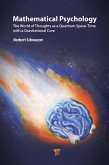Norbert Schwarzer
Mathematical Psychology (eBook, ePUB)
The World of Thoughts as a Quantum Space-Time with a Gravitational Core
104,95 €
104,95 €
inkl. MwSt.
Sofort per Download lieferbar

52 °P sammeln
104,95 €
Als Download kaufen

104,95 €
inkl. MwSt.
Sofort per Download lieferbar

52 °P sammeln
Jetzt verschenken
Alle Infos zum eBook verschenken
104,95 €
inkl. MwSt.
Sofort per Download lieferbar
Alle Infos zum eBook verschenken

52 °P sammeln
Norbert Schwarzer
Mathematical Psychology (eBook, ePUB)
The World of Thoughts as a Quantum Space-Time with a Gravitational Core
- Format: ePub
- Merkliste
- Auf die Merkliste
- Bewerten Bewerten
- Teilen
- Produkt teilen
- Produkterinnerung
- Produkterinnerung

Bitte loggen Sie sich zunächst in Ihr Kundenkonto ein oder registrieren Sie sich bei
bücher.de, um das eBook-Abo tolino select nutzen zu können.
Hier können Sie sich einloggen
Hier können Sie sich einloggen
Sie sind bereits eingeloggt. Klicken Sie auf 2. tolino select Abo, um fortzufahren.

Bitte loggen Sie sich zunächst in Ihr Kundenkonto ein oder registrieren Sie sich bei bücher.de, um das eBook-Abo tolino select nutzen zu können.
A drawback of standard approaches to try and understand the world of feelings such as love, hate, fear, and anger plus consciousness via quantum concepts results from the old problem that Quantum Theory does not appear to be fully compatible with Einstein's General Theory of Relativity.
- Geräte: eReader
- mit Kopierschutz
- eBook Hilfe
- Größe: 28.03MB
Andere Kunden interessierten sich auch für
![Mathematical Psychology (eBook, PDF) Mathematical Psychology (eBook, PDF)]() Norbert SchwarzerMathematical Psychology (eBook, PDF)104,95 €
Norbert SchwarzerMathematical Psychology (eBook, PDF)104,95 €![Making Sense (Routledge Revivals) (eBook, ePUB) Making Sense (Routledge Revivals) (eBook, ePUB)]() Making Sense (Routledge Revivals) (eBook, ePUB)54,95 €
Making Sense (Routledge Revivals) (eBook, ePUB)54,95 €![Psychology and Mental Health (eBook, ePUB) Psychology and Mental Health (eBook, ePUB)]() C. W. ValentinePsychology and Mental Health (eBook, ePUB)43,95 €
C. W. ValentinePsychology and Mental Health (eBook, ePUB)43,95 €![Intelligence Tests for Children (eBook, ePUB) Intelligence Tests for Children (eBook, ePUB)]() C. W. ValentineIntelligence Tests for Children (eBook, ePUB)43,95 €
C. W. ValentineIntelligence Tests for Children (eBook, ePUB)43,95 €![Psychological Aspects of Learning and Teaching (eBook, ePUB) Psychological Aspects of Learning and Teaching (eBook, ePUB)]() Psychological Aspects of Learning and Teaching (eBook, ePUB)37,95 €
Psychological Aspects of Learning and Teaching (eBook, ePUB)37,95 €![Educational Psychology in a Changing World (eBook, ePUB) Educational Psychology in a Changing World (eBook, ePUB)]() Gerda SiannEducational Psychology in a Changing World (eBook, ePUB)52,95 €
Gerda SiannEducational Psychology in a Changing World (eBook, ePUB)52,95 €![The Mathematical Foundation of Multi-Space Learning Theory (eBook, ePUB) The Mathematical Foundation of Multi-Space Learning Theory (eBook, ePUB)]() Tai WangThe Mathematical Foundation of Multi-Space Learning Theory (eBook, ePUB)41,95 €
Tai WangThe Mathematical Foundation of Multi-Space Learning Theory (eBook, ePUB)41,95 €-
-
-
A drawback of standard approaches to try and understand the world of feelings such as love, hate, fear, and anger plus consciousness via quantum concepts results from the old problem that Quantum Theory does not appear to be fully compatible with Einstein's General Theory of Relativity.
Dieser Download kann aus rechtlichen Gründen nur mit Rechnungsadresse in A, B, BG, CY, CZ, D, DK, EW, E, FIN, F, GR, HR, H, IRL, I, LT, L, LR, M, NL, PL, P, R, S, SLO, SK ausgeliefert werden.
Produktdetails
- Produktdetails
- Verlag: Taylor & Francis eBooks
- Erscheinungstermin: 28. November 2024
- Englisch
- ISBN-13: 9781040275542
- Artikelnr.: 72279857
- Verlag: Taylor & Francis eBooks
- Erscheinungstermin: 28. November 2024
- Englisch
- ISBN-13: 9781040275542
- Artikelnr.: 72279857
- Herstellerkennzeichnung Die Herstellerinformationen sind derzeit nicht verfügbar.
Norbert Schwarzer graduated in physics from the University of Chemnitz, Germany, in 1991. After several research projects abroad and a PhD in contact mechanics in 1998, he became an assistant professor at the University of Chemnitz in 1999. In 2005, he founded Saxonian Institute of Surface Mechanics. Dr Schwarzer has published a variety of papers in the fields of basic research and application of contact mechanical approaches for laminates, composites, and layered materials. Due to the need for better stability prediction and socioeconomic models, he started to apply the concepts from theoretical physics in more down-to-earth fields such as materials science, school transport, and sales market analysis. Some of this work finally led to the ideas for the improvement of the original theoretical concepts.
1. The Motivator 1.1 Information about the Motivator Book 1.2 Preface 1.3
Seelingrad 1.4 The Private 1.5 The Election 1.6 Muster 1.7 Extra Training
1.8 Poor Officers 1.9 Newspaper Money 1.10 Chicanery 1.11 Big Combat
Exercise 1.12 False Reports 1.13 Occupation 1.14 Backing 1.15 The Disabled
Company 1.16 Resistant Losers 1.17 "Common Field Mouse, Comrade Major!"
1.18 Spaniens Himmel and Freedom 1.19 The Enemy Wins and Turns Out to Be a
Brother in Arms 1.20 The Interrogation 1.21 Triumph 1.22 The Last Posse
1.23 Five Thousand Men at Tank Pace 1.24 Discharge 1.25 Gift Giving 1.26
The Call for Freedom 1.27 The End 2. Appetizers 2.1 How Do We Emit
Confidence or Can the Dunning-Kruger Effect Be Mathematically Derived? 2.2
The Mass Formation in the Quantum Gravity Model Picture 2.3 Time and
Uncertainty in Connection with Individuality and Subjectivity 2.4 The Path
of Desire 2.5 The Manifestation of Thought 2.6 Polarization 2.7 The Size of
a Thought 2.8 Intermediate Conclusions 3. Light Dishes 3.1 Brief Note about
the Thermodynamic of Thoughts 3.2 About the Fundamental Time and
Uncertainty of the Mind 3.3 A Timid Statement 3.4 Why Does Consciousness
Need Spirituality? 3.5 The Field-Illustration of Mass Formation 3.6
Outlook: What Happens when the Narrative Crumbles 3.7 A Connection to Chaos
Theory? 4. Meat 4.1 Love Fields: Just Another Example of Physics in
Psychology 4.2 More Quantum Gravity Topics and Their Bearing on
Mathematical Psychology 4.3 The Most Important Conclusion of Them All 5.
Desserts: Appendices 5.1 Appendix A: System as Ensemble of Properties 5.2
Appendix B: Fundamental Starting Point 5.3 Appendix C: Second-Order Quantum
Equations from the Einstein-Hilbert Action 5.4 Appendix D: Simple Example
for Dimensional Mass Creation 5.5 Appendix E: About the Inner Evolutionary
Potential of a System 5.6 Appendix F: About the Metric Origin of a Higgs
Field for an Arbitrary System 5.7 Appendix G: How Nudging a System Gives
Quantum Effects 5.8 Appendix H: First-Order Quantum Equations from the
Einstein-Hilbert Action 5.9 Appendix I: How Perturbation of the Classical
Hilbert Kernel in the Einstein-Hilbert Actions Automatically Leads to
Quantum Gravity Field Equations 5.10 Appendix J: The Introduction of a
Metric System Time 5.11 Appendix K: Metric Quantum Electrodynamics (MQED)
5.12 Appendix L: Homogenization 5.13 Appendix M: Derivation of the
Functional Derivative of the Scaled and Adjusted Einstein-Hilbert Action
with Respect to the Function f 5.14 Appendix N: Particles and Universes at
Rest Solutions 5.15 Appendix O: Obtaining Matter 5.16 Appendix P:
Electro-Magnetic Interaction (and Matter) via Space-Time Warping 5.17
Appendix Q: About the Dimensional Size of Systems 5.18 Appendix R: Compact
Derivation of the Most Fundamental Basics to a "Mathematical Psychology"
5.19 Appendix S: Hate or Love, One and the Same Source for Both?
Seelingrad 1.4 The Private 1.5 The Election 1.6 Muster 1.7 Extra Training
1.8 Poor Officers 1.9 Newspaper Money 1.10 Chicanery 1.11 Big Combat
Exercise 1.12 False Reports 1.13 Occupation 1.14 Backing 1.15 The Disabled
Company 1.16 Resistant Losers 1.17 "Common Field Mouse, Comrade Major!"
1.18 Spaniens Himmel and Freedom 1.19 The Enemy Wins and Turns Out to Be a
Brother in Arms 1.20 The Interrogation 1.21 Triumph 1.22 The Last Posse
1.23 Five Thousand Men at Tank Pace 1.24 Discharge 1.25 Gift Giving 1.26
The Call for Freedom 1.27 The End 2. Appetizers 2.1 How Do We Emit
Confidence or Can the Dunning-Kruger Effect Be Mathematically Derived? 2.2
The Mass Formation in the Quantum Gravity Model Picture 2.3 Time and
Uncertainty in Connection with Individuality and Subjectivity 2.4 The Path
of Desire 2.5 The Manifestation of Thought 2.6 Polarization 2.7 The Size of
a Thought 2.8 Intermediate Conclusions 3. Light Dishes 3.1 Brief Note about
the Thermodynamic of Thoughts 3.2 About the Fundamental Time and
Uncertainty of the Mind 3.3 A Timid Statement 3.4 Why Does Consciousness
Need Spirituality? 3.5 The Field-Illustration of Mass Formation 3.6
Outlook: What Happens when the Narrative Crumbles 3.7 A Connection to Chaos
Theory? 4. Meat 4.1 Love Fields: Just Another Example of Physics in
Psychology 4.2 More Quantum Gravity Topics and Their Bearing on
Mathematical Psychology 4.3 The Most Important Conclusion of Them All 5.
Desserts: Appendices 5.1 Appendix A: System as Ensemble of Properties 5.2
Appendix B: Fundamental Starting Point 5.3 Appendix C: Second-Order Quantum
Equations from the Einstein-Hilbert Action 5.4 Appendix D: Simple Example
for Dimensional Mass Creation 5.5 Appendix E: About the Inner Evolutionary
Potential of a System 5.6 Appendix F: About the Metric Origin of a Higgs
Field for an Arbitrary System 5.7 Appendix G: How Nudging a System Gives
Quantum Effects 5.8 Appendix H: First-Order Quantum Equations from the
Einstein-Hilbert Action 5.9 Appendix I: How Perturbation of the Classical
Hilbert Kernel in the Einstein-Hilbert Actions Automatically Leads to
Quantum Gravity Field Equations 5.10 Appendix J: The Introduction of a
Metric System Time 5.11 Appendix K: Metric Quantum Electrodynamics (MQED)
5.12 Appendix L: Homogenization 5.13 Appendix M: Derivation of the
Functional Derivative of the Scaled and Adjusted Einstein-Hilbert Action
with Respect to the Function f 5.14 Appendix N: Particles and Universes at
Rest Solutions 5.15 Appendix O: Obtaining Matter 5.16 Appendix P:
Electro-Magnetic Interaction (and Matter) via Space-Time Warping 5.17
Appendix Q: About the Dimensional Size of Systems 5.18 Appendix R: Compact
Derivation of the Most Fundamental Basics to a "Mathematical Psychology"
5.19 Appendix S: Hate or Love, One and the Same Source for Both?
1. The Motivator 1.1 Information about the Motivator Book 1.2 Preface 1.3
Seelingrad 1.4 The Private 1.5 The Election 1.6 Muster 1.7 Extra Training
1.8 Poor Officers 1.9 Newspaper Money 1.10 Chicanery 1.11 Big Combat
Exercise 1.12 False Reports 1.13 Occupation 1.14 Backing 1.15 The Disabled
Company 1.16 Resistant Losers 1.17 "Common Field Mouse, Comrade Major!"
1.18 Spaniens Himmel and Freedom 1.19 The Enemy Wins and Turns Out to Be a
Brother in Arms 1.20 The Interrogation 1.21 Triumph 1.22 The Last Posse
1.23 Five Thousand Men at Tank Pace 1.24 Discharge 1.25 Gift Giving 1.26
The Call for Freedom 1.27 The End 2. Appetizers 2.1 How Do We Emit
Confidence or Can the Dunning-Kruger Effect Be Mathematically Derived? 2.2
The Mass Formation in the Quantum Gravity Model Picture 2.3 Time and
Uncertainty in Connection with Individuality and Subjectivity 2.4 The Path
of Desire 2.5 The Manifestation of Thought 2.6 Polarization 2.7 The Size of
a Thought 2.8 Intermediate Conclusions 3. Light Dishes 3.1 Brief Note about
the Thermodynamic of Thoughts 3.2 About the Fundamental Time and
Uncertainty of the Mind 3.3 A Timid Statement 3.4 Why Does Consciousness
Need Spirituality? 3.5 The Field-Illustration of Mass Formation 3.6
Outlook: What Happens when the Narrative Crumbles 3.7 A Connection to Chaos
Theory? 4. Meat 4.1 Love Fields: Just Another Example of Physics in
Psychology 4.2 More Quantum Gravity Topics and Their Bearing on
Mathematical Psychology 4.3 The Most Important Conclusion of Them All 5.
Desserts: Appendices 5.1 Appendix A: System as Ensemble of Properties 5.2
Appendix B: Fundamental Starting Point 5.3 Appendix C: Second-Order Quantum
Equations from the Einstein-Hilbert Action 5.4 Appendix D: Simple Example
for Dimensional Mass Creation 5.5 Appendix E: About the Inner Evolutionary
Potential of a System 5.6 Appendix F: About the Metric Origin of a Higgs
Field for an Arbitrary System 5.7 Appendix G: How Nudging a System Gives
Quantum Effects 5.8 Appendix H: First-Order Quantum Equations from the
Einstein-Hilbert Action 5.9 Appendix I: How Perturbation of the Classical
Hilbert Kernel in the Einstein-Hilbert Actions Automatically Leads to
Quantum Gravity Field Equations 5.10 Appendix J: The Introduction of a
Metric System Time 5.11 Appendix K: Metric Quantum Electrodynamics (MQED)
5.12 Appendix L: Homogenization 5.13 Appendix M: Derivation of the
Functional Derivative of the Scaled and Adjusted Einstein-Hilbert Action
with Respect to the Function f 5.14 Appendix N: Particles and Universes at
Rest Solutions 5.15 Appendix O: Obtaining Matter 5.16 Appendix P:
Electro-Magnetic Interaction (and Matter) via Space-Time Warping 5.17
Appendix Q: About the Dimensional Size of Systems 5.18 Appendix R: Compact
Derivation of the Most Fundamental Basics to a "Mathematical Psychology"
5.19 Appendix S: Hate or Love, One and the Same Source for Both?
Seelingrad 1.4 The Private 1.5 The Election 1.6 Muster 1.7 Extra Training
1.8 Poor Officers 1.9 Newspaper Money 1.10 Chicanery 1.11 Big Combat
Exercise 1.12 False Reports 1.13 Occupation 1.14 Backing 1.15 The Disabled
Company 1.16 Resistant Losers 1.17 "Common Field Mouse, Comrade Major!"
1.18 Spaniens Himmel and Freedom 1.19 The Enemy Wins and Turns Out to Be a
Brother in Arms 1.20 The Interrogation 1.21 Triumph 1.22 The Last Posse
1.23 Five Thousand Men at Tank Pace 1.24 Discharge 1.25 Gift Giving 1.26
The Call for Freedom 1.27 The End 2. Appetizers 2.1 How Do We Emit
Confidence or Can the Dunning-Kruger Effect Be Mathematically Derived? 2.2
The Mass Formation in the Quantum Gravity Model Picture 2.3 Time and
Uncertainty in Connection with Individuality and Subjectivity 2.4 The Path
of Desire 2.5 The Manifestation of Thought 2.6 Polarization 2.7 The Size of
a Thought 2.8 Intermediate Conclusions 3. Light Dishes 3.1 Brief Note about
the Thermodynamic of Thoughts 3.2 About the Fundamental Time and
Uncertainty of the Mind 3.3 A Timid Statement 3.4 Why Does Consciousness
Need Spirituality? 3.5 The Field-Illustration of Mass Formation 3.6
Outlook: What Happens when the Narrative Crumbles 3.7 A Connection to Chaos
Theory? 4. Meat 4.1 Love Fields: Just Another Example of Physics in
Psychology 4.2 More Quantum Gravity Topics and Their Bearing on
Mathematical Psychology 4.3 The Most Important Conclusion of Them All 5.
Desserts: Appendices 5.1 Appendix A: System as Ensemble of Properties 5.2
Appendix B: Fundamental Starting Point 5.3 Appendix C: Second-Order Quantum
Equations from the Einstein-Hilbert Action 5.4 Appendix D: Simple Example
for Dimensional Mass Creation 5.5 Appendix E: About the Inner Evolutionary
Potential of a System 5.6 Appendix F: About the Metric Origin of a Higgs
Field for an Arbitrary System 5.7 Appendix G: How Nudging a System Gives
Quantum Effects 5.8 Appendix H: First-Order Quantum Equations from the
Einstein-Hilbert Action 5.9 Appendix I: How Perturbation of the Classical
Hilbert Kernel in the Einstein-Hilbert Actions Automatically Leads to
Quantum Gravity Field Equations 5.10 Appendix J: The Introduction of a
Metric System Time 5.11 Appendix K: Metric Quantum Electrodynamics (MQED)
5.12 Appendix L: Homogenization 5.13 Appendix M: Derivation of the
Functional Derivative of the Scaled and Adjusted Einstein-Hilbert Action
with Respect to the Function f 5.14 Appendix N: Particles and Universes at
Rest Solutions 5.15 Appendix O: Obtaining Matter 5.16 Appendix P:
Electro-Magnetic Interaction (and Matter) via Space-Time Warping 5.17
Appendix Q: About the Dimensional Size of Systems 5.18 Appendix R: Compact
Derivation of the Most Fundamental Basics to a "Mathematical Psychology"
5.19 Appendix S: Hate or Love, One and the Same Source for Both?







